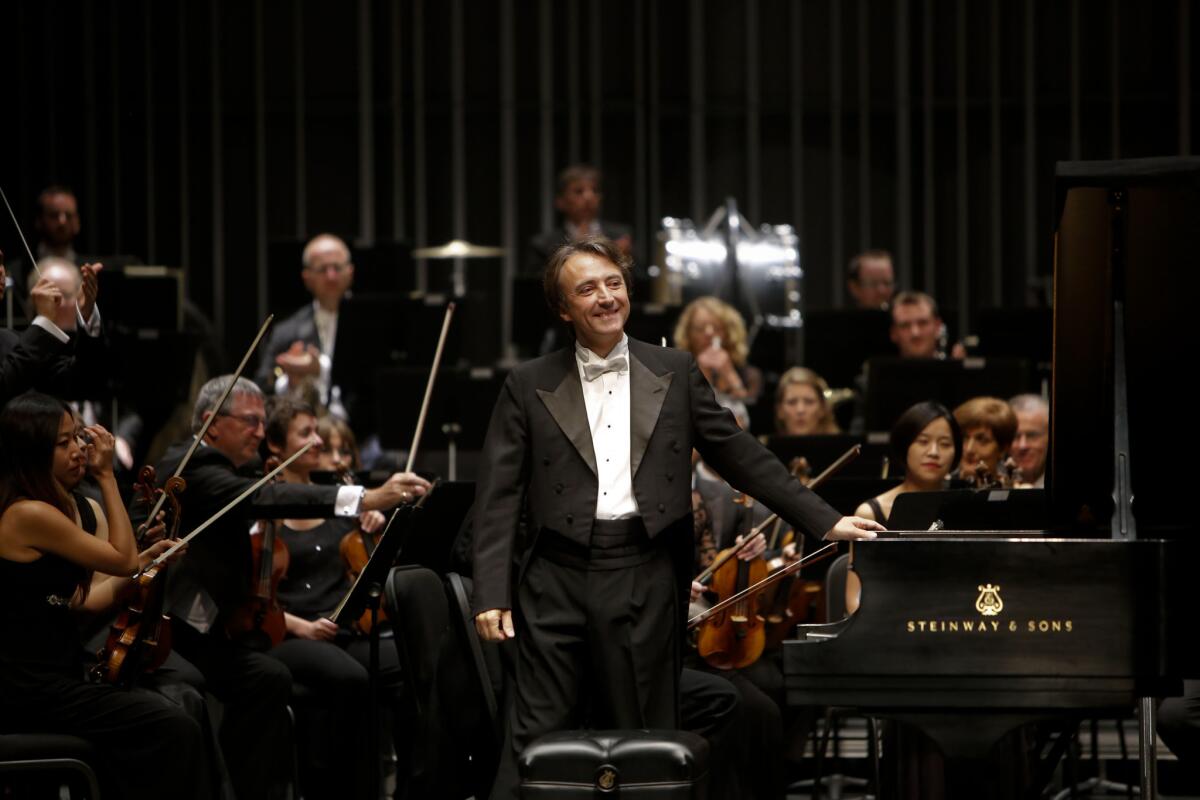Review: London Philharmonic Orchestra’s Jurowski a hypnotic force

Orchestral life in London is a monster. Five major orchestras compete, and with the likes of Valery Gergiev heading the London Symphony and Esa-Pekka Salonen at the Philharmonia, the battle for the best players and for audiences can be brutal. On top of that, the world’s great orchestras are regular visitors to what is musically the world’s busiest metropolis, upping the ante weekly.
No matter. On evidence of its appearance at the Valley Performing Arts Center in Northridge on Friday night, the London Philharmonic Orchestra appears to be thriving, thanks mainly to its mesmerizing music director, Vladimir Jurowski.
Leonine, ferociously intense, the 42-year-old Russian who took over the LPO in 2007 is a conducting magus. On the podium, he does not give the impression of encouraging, inspiring, collaborating, instructing or even commanding the orchestral musicians. The playing he gets from an exceptionally tight LPO seems, instead, to be the result of a hypnotic power over his orchestra players, compelling them involuntarily to do his bidding.
This can be, to Americans, slightly scary. Although he made his debut at the Metropolitan Opera when he was in his 20s and the Philadelphia Orchestra flirted with him as a potential music director candidate a few years ago, Jurowski remains mostly a European and Russian phenomenon. He was last in Southern California, visiting with the Russian National Orchestra, in 2008 and is long overdue for a return to the Los Angeles Philharmonic, which he hasn’t conducted since 2005.
The program Friday, which was repeated at the Renée and Henry Segerstrom Concert Hall in Costa Mesa on Saturday, was fairly conventional. Although Jurowski has brought far more adventure to the LPO than had been the case with its previous music director, Kurt Masur, all of Jurowski’s Los Angeles-area appearances have revolved around Russian music in general and Tchaikovsky in particular. This time the bill of fare was Dvorák’s “The Noonday Witch,” Prokofiev’s Third Piano Concerto — with Jean-Efflam Bavouzet as soloist — and Tchaikovsky’s Sixth Symphony (“Pathétique”).
Dvorák’s “Noonday Witch” is perhaps moderately novel, not musically but in its appearance on concert programs. It is the shortest and least popular of Dvorák’s four late tone poems, all of which are greatly overshadowed by the Czech composer’s concertos and last symphonies.
The folk tale that “Noonday Witch” describes is nasty. A mother accidentally smothers her child while trying to protect him from a witch who appears for lunch. Mom doesn’t survive either.
Dvorák’s dramatic score, in which cheerful music is vividly interrupted by fateful ghoulish music, is full of genial character as though a Halloween entertainment. Jurowski went for the fright.
The playing was clean and ominous. The suddenness of the shifts in tone were heart-stopping. A former music director of the Glyndebourne Festival Opera in England, Jurowski found the theatrical core of this 13-minute score, treating it as a wrenching mini-drama.
The Prokofiev concerto got an unusual performance as well. Bavouzet is a French colorist with a stupendous technique and a light touch. He skates over the keys. A specialist in French music, his recordings of Debussy’s solo piano music are superbly detailed.
Too delicate to be percussive, the pianist can easily be drowned out by a big orchestra, as he sometimes was during the Prokofiev concerto. But Bavouzet’s gleaming tone, his tremendous dexterity and his characterful grace paired surprisingly well with Jurowski’s soulfully understated accompaniment. Bavouzet’s encore of the last of Debussy’s piano preludes, “Feux d’artifice,” simply dazzled.
Enough of Tchaikovsky’s “Pathètique,” already. Jurowski conducted it at that last appearance with the Russian orchestra in Orange County. The Los Angeles Philharmonic, and other local orchestras, play the composer’s last symphony again and again and again. And yet, Jurowski’s performance was original and special.
He strained away every drop of schmaltz. He clarified textures and emphasized the black end of the spectrum of Tchaikovsky’s orchestral timbres. He went in for long lines. He lulled you with passages of extreme quiet, and then he pounced with dramatic suddenness on a sharp attack.
This was a world of desolation, of winter colors and interior emotions not allowed to surface self-indulgently. Jurowski made the lower strings buzz (he keeps vibrato way down) as though bassoons, and the bassoons bloom as though bass fiddles. The horns were taut and mean. The winds in this orchestra are outstanding, not gloomy but not bright either.
The performance avoided anything obvious. The second movement’s off-kilter waltz flowed on-kilter. The next movement’s march wasn’t militaristic, nor was it benign. The slow, fateful, lonely finale was not pathetic but patient. The symphony died away without incident, as though melody were lingering on, unheard but unstoppable, something to stay with, puzzle and affect its listeners for long after the concert ended.
More to Read
The biggest entertainment stories
Get our big stories about Hollywood, film, television, music, arts, culture and more right in your inbox as soon as they publish.
You may occasionally receive promotional content from the Los Angeles Times.











